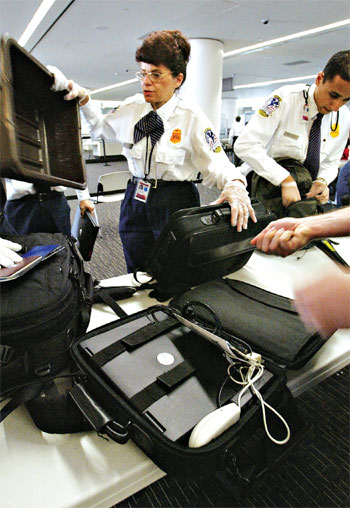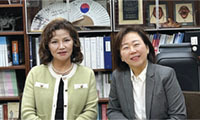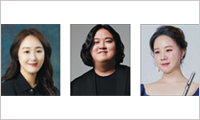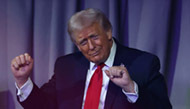At the Border, Data Searches And Seizures

U.S. Customs officers hunt for illegal activity by copying laptops and cellphones. Critics say this compromises sensitive information. JUSTIN SULLIVAN/GETTY IMAGES
At Dulles airport near Washington, Customs and Border Protection officers who staff the passport booths make quick decisions about travelers. They ask questions (often across language barriers) and watch computer displays that don’t go much beyond name, date of birth and codes for a previous customs problem or an outstanding arrest warrant.The officers are supposed to pick out the possible smugglers, terrorists or child pornographers and send them to secondary screening.
This secondary screening is where concerns have developed about invasions of privacy, for the most complete records on the travelers may be the ones they are carrying: their laptop computers full of professional and personal e-mail messages, photographs, diaries, legal documents, tax returns, browsing histories and other windows into their lives far beyond anything that could be stuffed into a suitcase .
Those revealing digital portraits can be immensely useful to inspectors, who now hunt for criminal activity and security threats by searching and copying people’s hard drives, cellphones and other electronic devices .
Digital inspections raise constitutional questions about how robust the guarantee of the Fourth Amendment of the United States Constitution should be “against unreasonable searches and seizures” on the border, especially in a time of terrorism. A total of 6,671 travelers had electronic gear searched from October 1, 2008, through June 2, 2010, just a tiny percentage of arrivals.
One regular target is Pascal Abidor, a New York-born student getting his Ph.D. in Islamic studies, who reported being frisked, handcuffed, taken off a train from Montreal and locked for several hours in a cell last May, apparently because his computer contained research material in Arabic and news photographs of Hezbollah and Hamas rallies. He said he was questioned about his political and religious views, and his laptop was held for 11 days.
Another is James Yee, a former Muslim chaplain at the Guantanamo Bay prison, who gets what he wryly calls a “V.I.P. escort” whenever he flies into the United States. In 2003, Mr. Yee was jailed and then exonerated by the Army after he had conveyed prisoners’ complaints about abuse, urged respect for their religious practices and reported obscene anti-Muslim caricatures being e-mailed among security staff.
Years later, he evidently remains on a “lookout” list. A federal agent greets Mr. Yee’s incoming plane, then escorts him to secondary screening.
Customs won’t comment on specific cases. In general, “we’re looking for anyone who might be violating a U.S. law and is posing a threat to the country,” a spokeswoman said.
Yet the agency’s practice of copying data has created a sense of risk among certain travelers, including lawyers who need to protect attorney-client privilege, business people with proprietary information, researchers who promise their subjects anonymity and photojournalists who may pledge to blur a face to conceal an identity. Some are now minimizing data on computers they take overseas.
“I just had to do this myself when I traveled internationally,” said Catherine Crump, a lawyer for the American Civil Liberties Union who is the lead attorney in a lawsuit challenging the policy on behalf of Mr. Abidor, the National Association of Criminal Defense Lawyers and the National Press Photographers Association.
During a week in Paris, she did legal work for clients, which she could not risk the government seeing as she returned.
“It’s a pain to get a new computer,” she said, “wipe it completely clean, travel through the border, put the new data on, wipe it completely clean again.”
The A.C.L.U. doesn’t want customs not to search, Ms. Crump said, but just wants the courts to require reasonable suspicion, as the Supreme Court did in 1985 .
The court distinguished intrusive inspection from “routine searches” on the border, which “are not subject to any requirement of reasonable suspicion, probable cause, or warrant.” Laptop searches should be considered “nonroutine,” Ms. Crump argues.
Mr. Abidor no longer takes the train home from Montreal. He doesn’t want to be stranded at the border . So in January his father drove up from New York to get him for vacation. The men were ordered to a room and told to keep their hands on a table while customs officers spent 45 minutes searching the car, and possibly the laptop, Mr. Abidor said. “I was told to expect this every time.”
By DAVID K. SHIPLER
스마터리빙
more [ 건강]
[ 건강]이제 혈관 건강도 챙기자!
[현대해운]우리 눈에 보이지 않기 때문에 혈관 건강을 챙기는 것은 결코 쉽지 않은데요. 여러분은 혈관 건강을 유지하기 위해 어떤 노력을 하시나요?
 [ 건강]
[ 건강]내 몸이 건강해지는 과일궁합
 [ 라이프]
[ 라이프]벌레야 물럿거라! 천연 해충제 만들기
 [ 건강]
[ 건강]혈압 낮추는데 좋은 식품
[현대해운]혈관 건강은 주로 노화가 진행되면서 지켜야 할 문제라고 인식되어 왔습니다. 최근 생활 패턴과 식생활의 변화로 혈관의 노화 진행이 빨라지고
사람·사람들
more
“창의력과 한국어 표현력 길러요”
남가주한국학원(이사장 박성수·교육감 신춘상)이 오는 6일(토) 오전 10시, 산하 11개 지역 학교에서 ‘제1회 글짓기 대회’를 개최한다. 학…

라크마 필하모닉 오케스트라&코랄… ‘크리스마스 패밀리나잇’ 콘서트
라크마(LAKMA) 필하모닉 오케스트라 & 코랄이 한 해를 마무리하는 따뜻한 크리스마스 음악 선물을 준비했다. 비영리 음악단체 라크마 필하모닉…
SMG, 자선 골프토너먼트 성황… 유스타재단에 3… 1
서울메디칼그룹(SMG)은 지난 4일 뉴포트비치 펠리칸힐 골프코스에서 ‘2025 자선 골프토너먼트’를 성황리에 개최했다. 이번 행사에는 내년 1…
LA 체육인의 밤 송년행사
LA 체육회가 주최한 체육인의 밤 송년행사가 지난 3일 LA 가든스윗 호텔에서 성황리에 열렸다. 이날 행사에는 각 가맹 종목 협회 회원들이 참…
‘다리 어워드’ 20주년 시상식
한국 문화체육관광부와 한국콘텐츠진흥원이 개최하는 2025 다리 어워드 20주년 시상식이 4일 오후 6시30분부터 LA 코리아센터에서 열린다.다…
많이 본 기사
- 검찰서 “김건희는 몰랐을 것”이라던 도이치 주포 특검선 반대로
- 美압박 받는 베네수엘라서 마두로 정치일대기 영화 제작돼
- 국민정보 해외유출 공포…C커머스·G마… 1
- [특파원시선] ‘FIFA 평화상’ 트럼프, 내년엔 노벨평화상 받을까
- 머스크, 스페이스X 주식매각 보도 부인… “정기 자사주 매입일뿐”
- 헤그세스 국방 “韓같은 모범동맹에 특혜…자기역할 못하는 동맹엔 후과”
- 홍명보호 월드컵 조별리그 경기, 한국시간 오전 10∼11시 시작
- ‘솔로 20년차’ 김장훈 “생활고 NO, 母에 해명하려 600만원 지출”
- 홍명보호 결전지 어떤 곳…항일운동 흔적·韓기업 대거 밀집
- ‘사기·우울증’ 겪은 자두.. “♥목사 남편, 엉망이던 나 다시 그려줘”
- 트럼프 “미국도 축구 ‘풋볼’로 부르… 1
- 업비트 54분만에 코인 1천억개 털렸는데…해킹 제재 피하나
- 조진웅, 연예계 은퇴 “배우 생활 마… 1
- BTS RM “해체·중단도 생각했지만…잘 준비해 보여드리겠다”
- 조세호, 조폭과 ‘단순 지인’ 아니었나..A씨 “아내도 술자리 동석”
- 남아공 호스텔서 총기 난사…어린이 포함 12명 사망
- 넷플릭스 워너 인수, 트럼프 승인 남았다…불발시 58억 달러 위약금
- “이제 진짜 승부가 남았다” 배용준, PGA투어 Q스쿨 최종전 진출... 노승열도 공동 4위 통과
- “구글 추격에 ‘코드레드 발령’ 오픈AI, 챗GPT 업데이트 앞당겨”
- 송성문 다저스행? 선수는 차분히 기다린다 “제가 알고 있는 정보와 다른 기사 많다→구체적 오퍼는 아직”
- 내 나이 39살, SON과 함께 2년 더 뛸래... 베테랑 요리스, LA FC와 1+1년 재계약
- EU외교수장, ‘유럽 맹폭’ 트럼프정부에 “美, 여전히 최대 동맹”
- 젤렌스키 “트럼프 특사와 통화…종전회담 다음 단계·형식 합의”
- “中행복할것” “민주주의보다 이익” 美서 새 국가안보전략 비판론
- 與 사법개혁안 처리 시동에 野 저지 … 1
- 미-우크라, 3일 연속 종전 협의… “실질적 진전은 러에 달려”
- FT ‘올해의 인물’에 젠슨 황 등 25인…한국계 미셸 강 포함
- 中 군축백서에 ‘한반도 비핵화’ 빠져… 1
- 주말 서울도심 집회…내란재판부 놓고 “위헌” vs “필요”
- “김하성, 윈터미팅서 가장 인기있는 타자 중 하나” 美 저명 기자 확신
1/5지식톡

-
 테슬라 자동차 시트커버 장착
0
테슬라 자동차 시트커버 장착
0테슬라 시트커버, 사놓고 아직 못 씌우셨죠?장착이 생각보다 쉽지 않습니다.20년 경력 전문가에게 맡기세요 — 깔끔하고 딱 맞게 장착해드립니다!장착비용:앞좌석: $40뒷좌석: $60앞·뒷좌석 …
-
 식당용 부탄가스
0
식당용 부탄가스
0식당용 부탄가스 홀세일 합니다 로스앤젤레스 다운타운 픽업 가능 안녕 하세요?강아지 & 고양이 모든 애완동물 / 반려동물 식품 & 모든 애완동물/반려동물 관련 제품들 전문적으로 홀세일/취급하는 회사 입니다 100% …
-
 ACSL 국제 컴퓨터 과학 대회, …
0
ACSL 국제 컴퓨터 과학 대회, …
0웹사이트 : www.eduspot.co.kr 카카오톡 상담하기 : https://pf.kakao.com/_BEQWxb블로그 : https://blog.naver.com/eduspotmain안녕하세요, 에듀스팟입니다…
-
 바디프렌드 안마의자 창고 리퍼브 세…
0
바디프렌드 안마의자 창고 리퍼브 세…
0거의 새제품급 리퍼브 안마의자 대방출 한다고 합니다!8월 23일(토)…24일(일) 단 이틀!특가 판매가Famille: $500 ~ $1,000Falcon: $1,500 ~ $2,500픽업 & 배송직접 픽업 가능LA…
-
 바디프렌드 안마의자 창고 리퍼브 세…
0
바디프렌드 안마의자 창고 리퍼브 세…
0거의 새제품급 리퍼브 안마의자 대방출 한다고 합니다!8월 23일(토)…24일(일) 단 이틀!특가 판매가Famille: $500 ~ $1,000Falcon: $1,500 ~ $2,500픽업 & 배송직접 픽업 가능LA…
케이타운 1번가
오피니언

‘배타적 시민권 법안’ 주시하고 대처해야

올 연말, 음주운전만은 피하자
 손영아 문화 칼럼니스트·YASMA7 대표
손영아 문화 칼럼니스트·YASMA7 대표 [손영아 문화산책] 두다멜 이후의 LA필, 새로운 스타를 향한 긴 탐색
 마크 A. 시쎈 / 워싱턴포스트 칼럼니스트
마크 A. 시쎈 / 워싱턴포스트 칼럼니스트 [마크 A. 시쎈 칼럼] 트럼프의 ‘마약선 타격’ 각본은 오바마가 썼다
 전병두 서북미수필가협회 회원
전병두 서북미수필가협회 회원 [금요단상] 인연
 민병권 / 서울경제 기자
민병권 / 서울경제 기자 [만화경] ‘분산에너지’의 본말전도

[왈가 왈부] 여 “내란재판부 연내 처리”… 후폭풍 감당할 자신 있나요
 이상희 UC 리버사이드 교수 인류학
이상희 UC 리버사이드 교수 인류학 저속 인생
 클라라 원 대한인국민회 기념재단 이사장
클라라 원 대한인국민회 기념재단 이사장 [기고] 중가주 사적지 역사탐방을 마치고
1/3지사별 뉴스

라커펠러 센터 크리스마스 트리 불 밝혀
맨하탄 라커펠러 센터의 대형 크리스마스트리 점등식이 3일 화려하게 펼쳐졌다. 5만여 개의 형형색색 LED 전구와 스와로브스키 크리스탈 별 장식…
H-1B심사 ‘검열(표현의 자유) 이력자’ 걸러낸다
연말‘산타 사기’ 조심하세요!
크리스마스를 앞두고 ‘산타 사기’(Santa Frauds)로 불리는 범죄가 기승을 부리고 있다.소비자보호단체(Better Business Bu…
송수 박사 초청‘치매’ 특강…포토맥 포럼, 11일

트럼프 정부, 국가안보전략서 유럽 맹폭… “문명 소멸” 경고
트럼프 정부는 5일 발표한 새 국가안보전략(NSS)에서 유럽이 “문명의 소멸” 위기에 있다면서 반(反)이민을 내세운 유럽 극우정당들을 지원하겠…
북가주 지역 한인들을 위한 무료 법률 상담회

오늘 하루 이 창 열지 않음 닫기 



















































.png)


댓글 안에 당신의 성숙함도 담아 주세요.
'오늘의 한마디'는 기사에 대하여 자신의 생각을 말하고 남의 생각을 들으며 서로 다양한 의견을 나누는 공간입니다. 그러나 간혹 불건전한 내용을 올리시는 분들이 계셔서 건전한 인터넷문화 정착을 위해 아래와 같은 운영원칙을 적용합니다.
자체 모니터링을 통해 아래에 해당하는 내용이 포함된 댓글이 발견되면 예고없이 삭제 조치를 하겠습니다.
불건전한 댓글을 올리거나, 이름에 비속어 및 상대방의 불쾌감을 주는 단어를 사용, 유명인 또는 특정 일반인을 사칭하는 경우 이용에 대한 차단 제재를 받을 수 있습니다. 차단될 경우, 일주일간 댓글을 달수 없게 됩니다.
명예훼손, 개인정보 유출, 욕설 등 법률에 위반되는 댓글은 관계 법령에 의거 민형사상 처벌을 받을 수 있으니 이용에 주의를 부탁드립니다.
Close
x